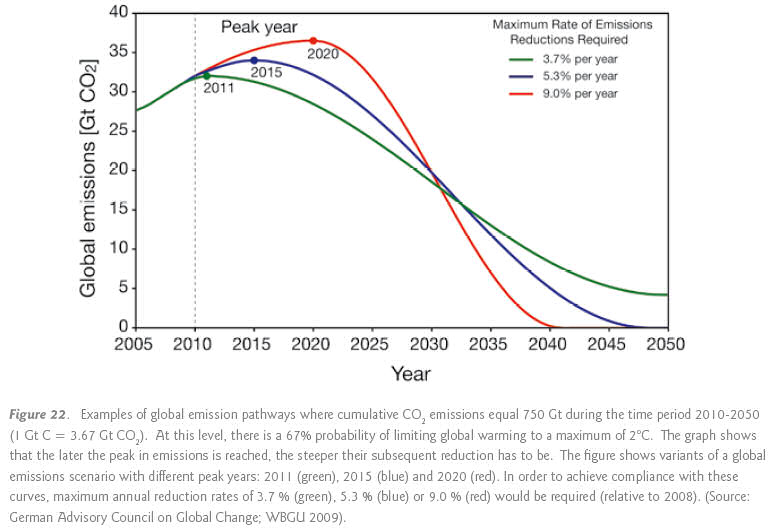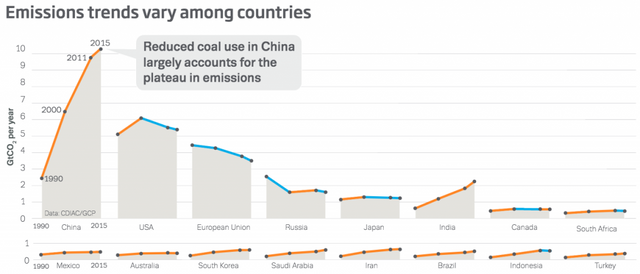Hi Albert,
I decided to do this as an open letter to facilitate input from the global community. This letter asks the question: What are we going to do about climate changes both now and in the future? It will begin with a background section for the reader followed by some current statistics and end on current and future problems.
Background
About the Author
I'm just a farmer with a scientific background. I'm one of the people out on the front lines dealing with the climate every day, keeping plants and animals alive in the face of record-breaking heat-waves, record-breaking rainfalls, droughts, floods, insect migrations, etc.
About Albert Bates
For people already familiar with Albert Bates' presentations on climate change and biochar, please skip to the next section. I first saw him at a Mother Earth News Festival presentation he gave in which he educates people on where we are today and what our options are for climate change. He presented a graph similar to the following graph which illustrates what we will need to do in order to mitigate climate change from global warming:

What this graph shows is that today, in 2017, we are approaching the red line in which we will need to reduce emissions by 9% per year, for 20 years, to keep global warming at 2 degrees Celsius. Nobody on the planet is coming anywhere near that type of reduction.
Albert then goes on to explain that this type of problem can't be solved by emissions reductions and it becomes one of removing carbon dioxide from the atmosphere. He shows that this can be done by "scrubbing" it out of the air through the use of trees and then converting it into a soil amendment by burning the trees without oxygen(pyrolysis). Finally he shows all the ways this can be done by both the rich and poor, old and young, men and women, educated and uneducated, people of any color, etc. Thus solving the problem of global warming and returning the planet to a garden of eden with an abundance for everyone. Here's the presentation:
Current Statistics
Climate Change
According to NASA, CO2 is currently at 405.92 parts per million in the atmosphere, global temperatures have risen 1.7 deg F since 1850, arctic ice is declining 13.3% per decade, land ice is losing 281 gigatonnes per year, and sea level is rising 1.4mm per year.
CO2 Emissions
According to Earth Syst. Sci. Data, 8, 1–45, 2016 at https://www.dropbox.com/sh/9j5c5e237lboixt/AADhGuzfseOoOPnnRbTTr9XJa?dl=0&preview=essd-2016-51-typeset_manuscript-version4.pdf
it looks like emissions have declined in more advanced countries while it may have peaked in less developed countries, shown in the following graph:

Problems
Current Problems
Based on the statistics above and current trends in society in general, we now have the following list of problems:
- Hot summers of increasing duration.
- Trees are flowering sooner.
- Plant and animal ranges have shifted.
- Loss of sea ice
- Accelerated sea level rise.
- Accelerated oil extraction.
- Deregulation of coal, oil, and gas.
- "Business as usual" for the majority of the planet (e.g. driving cars, consumerism, increasing carbon footprints per capita, etc)
Future Problems
If we project out a few years, based on climate prediction models, we can get an idea what is most likely to happen. Future problems will probably include the following:
- Temperatures will continue to rise 2.5 to 10 degrees Fahrenheit over the next century.
- More droughts and heat waves
- Sea level will rise 1-4 feet by 2100
- The Arctic Ocean is expected to become essentially ice free in summer before mid-century. This will unleash runaway global warming.
- Changes in precipitation patterns.
- Frost-free season (and growing season) will lengthen
The Big Question
Now we arrive at the whole point of this letter; the big question: What are we to do about climate change now and in the future? As one person, I can't burn enough biochar to offset what the rest of the planet is doing. I can't teach every person how to reduce their own emissions. I can't out-vote the idiocracy. So what are we to do? I'll give a few scenarios and hope that you can come up with some some solutions:
- Scenario 1(likeliness =1%): Global leaders set aside their differences , come together and pool their resources to defeat climate change. They relocate affected people, drop seeds and reforest everywhere, and switch to biochar for heat+energy.
- Scenario 2(likeliness=99%): Nobody does jack. Stuff hits the fan. A few mega-cities go underwater, crops fail, species go extinct, etc.
I'm particularly interested in Scenario 2 because it is the most likely, and I'm pragmatic. Here are a few key questions I don't know the answer to:
- What will be the best bio-region to be living in now and 50 years down the road?
- How do we deal with the heat? What types of cooling can be employed for crops? Or do we need to switch everything over to greenhouses? Or just switch crops? Move the farm?
- How do we deal with the longer growing season?
- How do we deal with increased precipitation?
- How do we deal with plants, animals, and insects migrating?
I hope it's clear that climate change is here, now, and we need solutions to mitigating it. There are thousands of people who will say "I told ya so", and even more that will say "jeez we should do something", and probably even more that will say "global warming doesn't exist". But that's not helpful. We need real solutions. We already marched in the streets, did civil disobedience, wrote to our congressmen, voted, switched to LEDs, composted, gardened, farmed organically, planted trees, chicken tractors, backyard bees, inflated our tires, carpooled, recycled, permaculture, prayed, meditated, and so on and so forth. It's time to talk about low-cost, wind-proof hoophouses, heat-tolerant crops, DIY swales and levees, crowd-sourced plant/animal/insect migration tracking, and so much more.
Sincerely,
WhyteHorse
we gon flood boys
Downvoting a post can decrease pending rewards and make it less visible. Common reasons:
Submit
Dear WhyteHorse:
I can see there is a lot to unpack here, but to start with I would say you have my position pretty well right, so lets agree to agree. When you put the chance of a change from Business As Usual at 1 percent, that matches precisely the number I gave in my keynote at the Local Futures: Values, Action, Leadership conference in Michigan in 2010.
The second thing I would observe is that in the interceding years between that talk, the numerous Mother Earth News Fairs talks, and now, science continues to improve and some rather new and surprising data has come in. The Arctic Sea is losing ice much more rapidly than anticipated, which greatly effects the albedo mechanism; there are huge methane releases both from shallow oceans and from fracking; and the rate at which C concentrations grow in the atmosphere appears to be accelerating even as emissions have plateaued or even declined, suggesting that tipping points are now in command of the outcome, more than human activities. I detail this, and more, in my most recent book, The Paris Agreement (2016).
Lets take your 5 questions.
There are no unaffected bioregions, and 50 years is a long time to try to project, but I would say that areas moderated by ocean temperatures, such as coastlines and islands, will be more temperate than mid-continental regions. Sea level rise should be considered, since if sea level equilibrium were already reached for the present degree of warming the oceans would be some 75 feet higher now. A sailboat or houseboat is a good option. Regions retaining somewhat more favorable climate will likely receive more in-migration, despite largely futile efforts by governments to arrest that. Civil chaos is likely to grow. Death becomes cheap. See Orlov's Five Stages of Collapse.
Warm climate food production is nothing new. It will expand. What is difficult is the extreme variability. For this reason you are likely correct about more indoor operations. Aquaponics in particular will likely surge. Outdoor wet systems like chinampas and mixed age polyculture food forests are more stable and also can achieve drawdown of legacy carbon at scale.
I would not bet on a longer growing season. Note my mention above of variability. Extreme variability. Think killing frost in July in the N. Hemisphere, or January in the S. Hemisphere. Shorter winters may also mean more survival of pest larvae.
Wet climate food production is nothing new. Use it to advantage.
Loss of pollinators and bad migratory timings is one of the most neglected challenges we will face. The phenological databases at UNC and U-Ariz give some indication of how fast this has been happening. Self-pollinating plantings and other strategies can help but will not entirely mitigate the disaster about to be experienced. Instead of asking how we as humans will cope, we should be asking about how other essential populations will cope.
You mention some useful things to be doing. I recommend taking a permaculture course, meditating, writing poetry, and finding the places sacred to you and honoring those. We may NOT make it out of this. Accept that. Don't take all the blame, because this deal may have come signed and sealed before you were born. And yet, there is still hope. And as long as that is the case, acting as though something can be done, and doing it, is what puts a spring in my step every morning, and a song on my lips as I get back to work.
Downvoting a post can decrease pending rewards and make it less visible. Common reasons:
Submit
Well thank you for that very thoughtful response! Just a couple quick follow-on questions.
but it's old(2007). Since then, we've discovered that methane from permafrost in Siberia and the arctic are accelerating climate change and methane is 30x better at trapping heat than CO2, and 100x better over 5 years. So now that we have warming, we get more methane. With more methane we get more heat. It's a runaway condition. I don't know if anybody has corrected the model for this new data? Also I wasn't able to confirm a sea level rise of 75ft, but I did find 7.5 ft and worst case of 23ft.
5 Bees: Do you think Warre hives surrounded by lots of flowering things will be sustainable in the long run?
I don't accept that we won't make it out of this. Have you seen the research on anti-ageing? It's quite possible we may live a very long time. There's also that whole exponential technology artificial intelligence thing. Do you think that people don't care about climate change because they think they will be dead long before it becomes a problem? Perhaps if they thought they were going to be around to see it, the light bulb might go on?
Downvoting a post can decrease pending rewards and make it less visible. Common reasons:
Submit